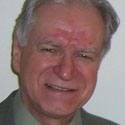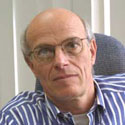Advisory Board and Editors Molecular Biology

Jesús Campos-García
PhD. Jesús Campos-García.
Professor-Researcher of Microbial Biotechnology Laboratory since 2003, at the Research Institute of Biological Chemistry of the Universidad Michoacana de San Nicolás de Hidalgo, México. He has authored over 80 papers in indexed and peer-reviewed journals. He was the recipient of the National Award for Young Researchers in 2008, for the Mexican Academy of Science. He possesses four Patents and several Technological processes transferred into the Industry.
Research areas are related to the study of the mechanisms of interaction of microorganisms such as Pseudomonas aeruginosa with the environment: mechanisms of organic compounds degradation, heavy metals resistance, host-pathogen interaction, microbial nano-bioactive metabolites, and genetic modification of industrial GEMs used for alcoholic fermentation and biofuels.
Awards
•National Award for Young Researchers in 2008, for the Mexican Academy of Science.
•State Award of Scientific Research in 2009, Michoacán State Government, México.
•Grant Marcos Moshinsky 2013-2014, Chemistry-Biological Sciences. Marcos Moshinsky Funding, México.
•Weizmann Award 2015, Nature Science. Mexican Academy of Science, to Randy Ortíz Castro by PhD thesis: Study of the N-acil-L-homoserin lactones and cyclodipeptides from bacteria of Pseudomonas genus in the plant development regulation.
•Member of the Mexican Academy of Science (since 2008).
•Member of the National System of Researchers (S.N.I.) since 1996.

Yunpeng Cao
Dr Yunpeng Cao is Associate Researcher (CAS Key Laboratory of Plant Germplasm Enhancement and Specialty Agriculture) at Wuhan Botanical Garden, Chinese Academy of Sciences. His research interests mainly focus on the Systematics and Evolution, Genomics, Fruit Development and Regulatory Mechanism.

Alberto Carbonell
CSIC Group Leader working at Institute for Plant Molecular and Cell Biology.
Research has focused on the study of different areas of RNA biology in plants and viruses: from the basic understanding on how RNAs regulate gene expression and control or induce diseases to a more applied and biotechnological research aiming to engineer artificial RNAs for the efficient and selective control of plant gene expression or to repress pathogenic RNAs and generate disease resistance.
Current research seeks to develop GMO-free biotechnological tools for crop improvement based on artificial small RNAs.

Ylenia Carotenuto
Dr. Ylenia Carotenuto is a Researcher within the Department of Integrative Marine Ecology, Stazione Zoologica Anton Dohrn, Italy.
Her research interests focus on Plankton Chemical Ecology, Molecular Ecology and Next Generation Sequencing.

Ruben J. Cauchi
Ruben J. Cauchi is an Associate Professor of Neurogenetics at the University of Malta School of Medicine. He obtained his D.Phil. from the University of Oxford (UK) and did his postdoctoral research at the MRC Laboratory of Molecular Biology, University of Cambridge (UK). Prof. Cauchi heads the ALS/MND Lab at the University of Malta and leads Malta’s National ALS/MND Registry & BioBank, aiming at understanding the cause of motor neuron disease (MND) including amyotrophic lateral sclerosis (ALS) and identify innovative treatments.

Elisabetta Ada Cavalcanti-Adam
E. Ada Cavalcanti-Adam is a research group leader at the Institute of Physical Chemistry, University of Heidelberg and head of Central Scientific Facility “Biomaterials and Molecular Biology” at the Max Planck Institute for Intelligent Systems in Stuttgart. Her main research interest is on extracellular stimuli which guide cell structure and functions with a special focus on the role of growth factors on cell adhesion and migration.

Jeff H. Chang
Jeff Chang is an Associate Professor of Botany and Plant Pathology at Oregon State University. His research group focuses on the interactions between bacteria symbionts and plants.

Albert Cheng
Albert Cheng obtained his BSc in Biochemistry and MPhil in Biology from Hong Kong University of Science and Technology in 2005 and 2007, respectively. He studied neurotrophin signaling and C. elegans developmental genetics. He then pursued his PhD in Computational & Systems Biology at MIT in the labs of Profs Christopher Burge and Rudolf Jaenisch and worked on various topics on epigenetics, gene regulation and alternative splicing in stem cells, reprogramming, cancer metastasis, erythropoiesis and differentiation. Cheng and colleagues identified H3K27ac as a signature for active enhancers. He analyzed alternative splicing in epithetlial-mesenchymal transition, cancer metastasis as well as erythropoiesis and identified splicing factors regulating these processes. He constructed CRISPR-on, an artificial RNA-guided activator based on CRISPR/Cas. After graduating in 2014, he joined the Jackson Laboratory at Bar Harbor, ME, as one of the first JAX scholars where he continued to work on understanding and improving the CRISPR/Cas technology. In July 2015, he started his own lab as an assistant professor at the Jackson Laboratory for Genomic Medicine campus at Farmington, CT.

Piotr Chomczynski
Founder, Molecular Research Center, Inc. (MRC). Inventor of the single-step method of RNA isolation. Active in Science to Business projects.

Olivier Civelli
Chair and Professor, Pharmacology and Eric L. and Lila D. Nelson Chair in Neuropharmacology, School of Medicine, University of California, Irvine.

Maria Carmen Collado
Maria Carmen Collado (PhD 2005) holds a Research Scientist position at the Spanish National Research Council (CSIC) at the Institute of Agrochemistry and Food Technology (IATA-CSIC) in Valencia (Spain). Her research work is multidisciplinary and includes microbiology, food science, nutrition and human health. Her interests are focused on probiotics, microbiota and health and nutrition during pregnancy and early life period.

Daniele Filippo Condorelli
Degrees M.D.: University of Catania (Italy), 1974-1980. Specialist in Neurology: University of Catania, 1980-1984. Ph.D. in Medical Biochemistry and Biology: University of Bari and Catania, 1984-1986.
Professional positions: 2001- today: Full professor of Biochemistry, School of Medicine, University of Catania; 1988-2000: Associate Professor of Biochemistry, University of Catania;. 2005-2009: Director of the School of Clinical Biochemistry; 2007-2013 coordinator of the PhD School in Translational Biomedicine.
Scientific publications.
1981-2018: 134 scientific papers in international peer-reviewed journal and 25 book chapters. Citations (years 1985-2018): 4612; without self-citations: 4367 (Web of Science, ISI); h-index 40
Research training abroad: 1983: Research associate at the MRC Developmental Neurobiology Unit. London (Dir.: Prof. R. Balazs); 1989-1990: Research associate at the Neurobiochemistry Group of the Mental Retardation Center, UCLA, Los Angeles (Dir.: Prof J. De Vellis)
Research interests: Neurotransmitter and neurotrophin receptors in glial cells; structure and expression of the glial fibrillary acidic gene; molecular biology of neuronal connexins; Experimental therapy of glioma tumors; Cancer genomics; Transcriptomics.
Council of International Scientific Societies:
2000-2004: elected member of the Council of the International Society for Developmental Neuroscience. 2007-2011: elected member of the Council of the International Society for Neurochemistry.

